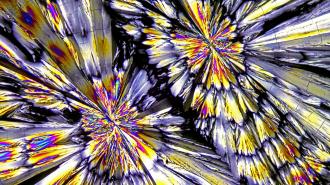A new study has found that ketamine works at least as well as electroconvulsive therapy (ECT) for patients with treatment-resistant major depression. The clinical trial, led by investigators at Mass General Brigham, is the largest to date to compare the two therapies, the researchers said.
The results suggest that ketamine should be considered as a frontline option for treatment-resistant depression; currently, electroconvulsive therapy (ECT) holds that position.
“ECT has been the gold standard for treating severe depression for over 80 years,” Amit Anand, lead author and director of psychiatry translational clinical trials at Mass General Brigham, said.
Both therapies have their potential drawbacks, however, ones which may need weighed and studied carefully. While ECT can be effective, it is also “a controversial treatment because it can cause memory loss, requires anesthesia and is associated with social stigma,” Anand said.
A new study has found that ketamine is “non-inferior” to ECT in patients with treatment-resistant depression.
For its part, ketamine — a widely-used anesthetic, as well as a dissociative party drug — has also shown efficacy for treating depression, but the risks of long-term use, including addiction, aren’t well known.
“It’s a question of risk assessment for each individual patient,” Boris Heifets, a ketamine researcher at Stanford University uninvolved with the study, told STAT’s Olivia Goldhill. “Neither of these things is risk-free, neither is transformative.”
Where to go when treatment fails: As the name suggests, people with treatment-resistant depression do not respond to typical depression treatments, including common antidepressants like SSRIs (Prozac or citalopram, for example).
When other options have failed, doctors and patients may consider ECT or ketamine therapy for intractable, serious depression.
In the correct dosage, and combined with therapy, ketamine has shown itself to be a remarkably fast-acting antidepressant in multiple trials. Because the drug is already legal, ketamine clinics are able to offer it, often as an infusion — although difficult business headwinds have seen clinics shuttered, sending patients scrambling. The FDA has approved a prescription nasal spray treatment, Esketamine, based on the drug.
The drug is also potentially addictive, a potential side effect not well studied in a psychiatric setting.
“The follow-up period of the current trial was not long, nor did it assess future drug-seeking behavior among those who did or did not have a response to ketamine,” Robert Freedman, a psychiatry professor at the University of Colorado Denver School of Medicine, wrote in a NEJM editorial about the latest study.
Ketamine “combines properties that many persons — not only those with severe depression — find rewarding,” Freedman wrote. “Accordingly, ketamine is also widely used recreationally. The question raised by this trial and others is how clinicians and regulatory agencies should regard its use and abuse.”
ECT is a procedure wherein a small electrical current is sent through a patient’s brain while they are under general anesthesia, and can be quite effective for patients with difficult to treat depression.
On the other hand, ECT is a procedure wherein a small electrical current is sent through a patient’s brain while they are under general anesthesia. Contrary to its common portrayal in movies, it isn’t painful. But while the therapy can be quite effective for patients whose depression cannot be treated otherwise, studies have found that there is a risk of cognitive impairment, including memory deficits, Goldhill reported.
“It becomes a matter of which side effects are you more comfortable with,” Heifets told Goldhill. “Neither of these treatments is perfect.”
A previous meta-analysis of studies found ECT to be more effective than ketamine — but there are some caveats to that, Goldhill pointed out. Namely, that’s an overview of multiple small trials, focused on major depressive disorder, but not treatment-resistant depression per se.
The new trial has a larger sample size, so it should be better able to detect a clinical difference between patients. It also looked at patients whose cases may be considered more severe, and only patients who had no psychosis and did not respond to SSRIs, Goldhill wrote.
The trial: Mass Gen Brigham researchers conducted the study at 5 sites from March 2017 to September 2022. In all, 403 patients were randomized into two different groups: one which received ECT three times a week for three weeks, and one which received ketamine therapy two times a week for three weeks. Researchers followed the patients for an additional six months, using a depression symptom self-assessment, memory tests, and questions about their day to day.
The team found that 55% of the ketamine group reported at least a 50% improvement in their self-reported depression symptoms and their quality of life, compared to 41% in the ECT group. ECT patients did show some memory loss — which improved over the six months of followup, Goldhill reported — and musculoskeletal adverse effects. Ketamine patients reported having a trip experience during their sessions, which is common.
The study suggests that patients should have the opportunity to try ketamine before ECT, says Yale’s John Krystal.
The upshot: “I believe that this study is extremely important,” John Krystal, a professor of psychiatry, neuroscience, and psychology at Yale, tells Freethink. Krystal, whose lab identified ketamine’s antidepressant properties, was not involved with the Mass Gen Brigham study.
“It suggests that ketamine, and presumably Esketamine, are as effective for treatment-resistant symptoms of depression as electroconvulsive therapy. Compared to ECT, ketamine and Esketamine are less costly, less risky, and less burdensome to both patients and to Health Centers,” Krystal says.
Both treatments are fast-acting, which makes them especially useful for emergency situations, but ketamine’s long-term effects are understudied.
“The challenges with ECT and ketamine are, you can get an acute response, but how do you actually maintain it?” Anand told Goldhill.
The results suggest that, except for cases where ketamine and Eketamine are contra-indictated, “patients with treatment-resistant symptoms of depression should have the opportunity to be treated with ketamine and Esketamine before receiving ECT,” Krystal says.
We’d love to hear from you! If you have a comment about this article or if you have a tip for a future Freethink story, please email us at [email protected].






